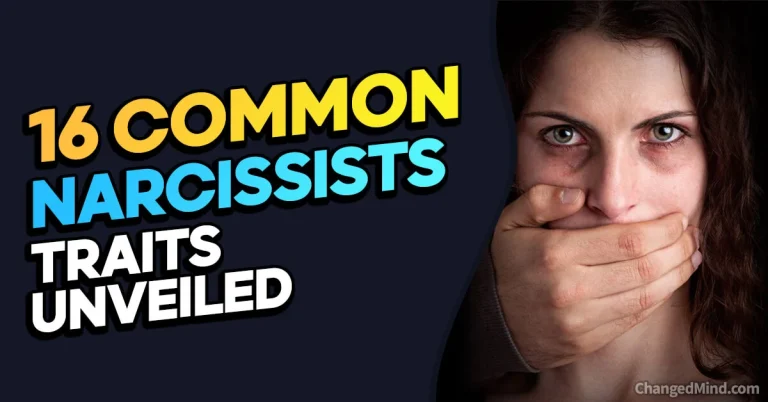Welcome, fellow warriors in the battle against narcissistic mind games! We’ve all been there, haven’t we? Caught in the clutches of a narcissist’s fake apology, desperately searching for ways to navigate the treacherous waters. Well, fear not!
In this article, we’ll equip you with the Jedi-like skills needed to detect their deceptive tactics and respond like the superhero you truly are. So, buckle up and get ready to unveil the secrets of the narcissist’s fake apology!
Short Answer:
So, you want to know how to respond to the narcissist’s fake apology? The short answer is: with wit, wisdom, and an ironclad shield of self-awareness. But hold on, there’s so much more to discover!
In this article, we’ll explore:
- Understanding the art of the narcissist’s fake apology and its manipulative purpose.
- Unveiling common traits and patterns in their apology tactics, ensuring you never fall for their trickery again.
- Identifying the signs, language cues, and red flags that expose their insincere apologies.
- Equipping you with practical strategies to respond effectively, maintain boundaries, and safeguard your emotional well-being.
- Empowering you to break free from their control, nurture self-care, and rebuild your self-esteem.
Get ready to reclaim your power and triumph over the narcissist’s web of manipulation. Let’s dive in and uncover the truth behind their deceptive apologies!
Understanding Narcissism and its Manipulative Tactics
To truly comprehend the gravity of a fake apology, it is crucial to grasp the essence of narcissism. Narcissists possess an excessive sense of self-importance, an insatiable craving for admiration, and a distinct lack of empathy. These traits form the foundation of their manipulative tactics, allowing them to exploit and control those around them.
The Importance of Recognizing a Fake Apology
In a world where genuine apologies are valued, narcissists wield fake apologies as powerful weapons in their manipulation arsenal. Recognizing a fake apology is essential for your emotional well-being and the reclamation of your personal power. By seeing through their facade, you can break free from their toxic grasp.
Narcissist Lies To Control You
Unraveling the twisted web of narcissistic manipulation requires us to focus on a key aspect: the lies they tell to control you. By understanding the patterns, tactics, and language behind their fake apologies, you will be better equipped to protect yourself from their deceitful games.
Understanding the Narcissist’s Fake Apology

Defining a Fake Apology and its Purpose in Manipulating Others
Picture this: you find yourself embroiled in a conflict with a narcissist, hoping for a sincere apology to mend the emotional wounds inflicted upon you. But what you receive instead is a fake apology, carefully crafted to manipulate and maintain control over you. So, what exactly is a fake apology?
A fake apology is a disingenuous expression of remorse, devoid of true accountability and empathy. It’s a calculated move designed to further the narcissist’s agenda, rather than a genuine attempt to right a wrong. By offering a counterfeit apology, narcissists can maintain their power, gaslight their victims, and keep the cycle of manipulation intact.
Unveiling Common Traits and Patterns in Narcissists’ Apology Tactics
Narcissists are skilled actors on the stage of deceit. They employ specific traits and patterns in their apology tactics, aiming to deceive their victims and perpetuate their control. Here are some key traits to be aware of:
- Lack of Authentic Remorse: Genuine remorse requires introspection and a willingness to change. However, narcissists lack the ability to genuinely acknowledge their wrongdoing, making their apologies shallow and insincere.
- Shifting Blame and Minimization: Watch out for how narcissists divert blame or downplay their actions in their apologies. They may attribute their behavior to external factors or minimize the impact, ensuring they don’t take full responsibility for their actions.
- Playing the Victim Card: Narcissists are masters at flipping the script and portraying themselves as the victim in the situation. They may twist the narrative, making you feel guilty for even expecting an apology from them.
- Empty Promises: In their apologies, narcissists often make grandiose promises of change or improvement. However, these promises rarely translate into genuine transformation, as their manipulative behavior persists.
Understanding the Psychological Impact of Falling for a Fake Apology
The psychological impact of falling for a narcissist’s fake apology can be devastating. It erodes your self-esteem, distorts your perception of reality, and perpetuates the cycle of abuse. Here’s why:
- Doubt and Self-Blame: Accepting a fake apology can lead to self-doubt and self-blame. You may question your judgment, wondering if you’re overreacting or misunderstanding the situation.
- Normalization of Toxic Behavior: By accepting a fake apology, you inadvertently validate the narcissist’s toxic behavior. This normalization can make it harder to recognize and escape the cycle of abuse.
- Emotional Manipulation: Narcissists are experts in emotional manipulation. Falling for their fake apology allows them to continue their manipulative tactics, undermining your emotional well-being and perpetuating their control.
- Reinforcement of Narcissistic Traits: Each time you accept a narcissist’s fake apology, you reinforce their narcissistic traits. This makes it increasingly challenging to break free from their influence and establish healthy boundaries.
It’s time to unmask their deceptive tactics and equip ourselves with the knowledge needed to navigate through their web of manipulation. Let’s explore some common types of fake apologies you might encounter on your journey:
The Over-The-Top Apology
Ah, the grand spectacle of an over-the-top apology! Picture this: the narcissist puts on a show, complete with theatrical tears and a heart-wrenching monologue. It’s like watching a Hollywood drama unfold, except this performance is all about their attempts to regain control. Don’t be fooled by the theatrics—they’re just trying to manipulate your emotions and keep you under their spell.
The Overly Detailed Apology
Beware the overly detailed apology, dear reader. It’s a masterclass in diversion and deflection. The narcissist bombards you with intricate explanations, long-winded justifications, and irrelevant details, all to distract you from the core issue at hand—their own behavior. They hope you’ll get lost in the maze of their words and forget to hold them accountable.
The Blaming Apology
Ah, yes, the blaming apology—the narcissist’s favorite trick. They skillfully twist the narrative, shifting the blame onto you or anyone but themselves. Instead of taking responsibility, they point fingers, highlight your perceived flaws, and accuse you of being overly sensitive or unreasonable. It’s a classic maneuver to avoid facing their own shortcomings.
The “I’m Sorry, But” Apology
Beware the dangerous “I’m sorry, but” apology, dear reader. This seemingly remorseful statement is nothing more than a manipulation tactic. The narcissist may offer an apology, but it’s quickly followed by a “but” that invalidates their supposed remorse. They may say, “I’m sorry, but you know how sensitive you are.” It’s a sly way of shifting blame and diminishing the impact of their actions.
The Hollow Apology
Oh, the hollow apology—the one that echoes with emptiness. It lacks sincerity, empathy, and genuine remorse. The narcissist may utter the words, but their tone and body language reveal the hollowness behind their façade. It’s as if they’re going through the motions without truly understanding or caring about the pain they’ve caused.
The Denied Apology
Last but not least, we have the denied apology—a truly baffling phenomenon. The narcissist may deny ever needing to apologize, insisting that they’ve done nothing wrong. They might gaslight you, making you doubt your own perception of reality. This tactic is designed to keep you off balance, questioning your own sanity, and perpetuating their control.
Understanding these different types of fake apologies gives you the upper hand, dear reader. It allows you to see through their charade and protect yourself from further manipulation. In the next section, we’ll delve into effective strategies for responding to these deceptive tactics and reclaiming your power. Stay tuned!
Identifying a Narcissist’s Fake Apology
When it comes to dealing with a narcissist, being able to distinguish a genuine apology from a fake one is crucial for your emotional well-being and personal growth. In this section, we’ll uncover the signs, language, behaviors, and body language cues that can help you identify a narcissist’s insincere apology.
Recognizing Signs and Red Flags of Insincere Apologies
To uncover a narcissist’s fake apology, keep an eye out for these telltale signs and red flags:
- Absence of Genuine Remorse: A fake apology lacks sincerity and genuine remorse. Instead, it may come across as forced or insincere, devoid of any emotional depth.
- Non-Apology Apology: Narcissists often employ what is known as a “non-apology apology.” It’s a statement that may seem like an apology on the surface, but it actually avoids taking real responsibility for their actions.
- Blame-Shifting: Watch out for subtle or overt attempts by the narcissist to shift blame onto others or external factors. They may try to make you feel at fault for their behavior, diverting attention away from their own actions.
- Lack of Empathy: Narcissists struggle to genuinely empathize with others. If their apology lacks empathy or fails to address the emotional impact they’ve had on you, it’s likely a fake apology.
Language, Behavior, and Body Language Cues
To detect a narcissist’s fake apology, pay attention to specific language, behavior, and body language cues that may reveal their true intentions:
- Vague Language: Fake apologies often use vague or general language without directly acknowledging the specific harm caused. They may avoid admitting fault or offering concrete solutions to prevent similar incidents in the future.
- Defensiveness: Instead of displaying openness to feedback and constructive dialogue, narcissists tend to become defensive when confronted about their behavior. They may deflect criticism or become hostile to maintain control over the situation.
- Lack of Accountability: A genuine apology includes accepting responsibility for one’s actions. However, narcissists avoid taking ownership and may even deny or downplay their role in the situation.
- Inconsistent Nonverbal Cues: Pay attention to their nonverbal communication. A narcissist’s body language may contradict their words. They may maintain a nonchalant or dismissive demeanor, displaying minimal concern for your feelings.
Illustrating Fake Apologies with Real-Life Examples
To further solidify your understanding, let’s explore a couple of real-life examples of fake apologies:
Example 1: The Deflection Expert
Imagine you confront a narcissistic friend about a hurtful comment they made. Instead of offering a genuine apology, they respond with, “I’m sorry you’re so sensitive. I didn’t mean it that way.” In this instance, they shift the blame onto you, deflecting their responsibility and invalidating your emotions.
Example 2: The Empty Promise Maker
Your partner, who exhibits narcissistic tendencies, consistently breaks promises and fails to show up emotionally. When confronted, they apologize profusely, promising to change and do better. However, time and time again, they repeat the same hurtful behaviors, proving that their apologies were empty and insincere.
By recognizing these signs, language patterns, behaviors, and body language cues, you can arm yourself with the knowledge needed to navigate the treacherous realm of narcissistic manipulation. In the next section, we’ll delve into effective strategies for responding to a fake apology and reclaiming your power.
How to Respond Effectively
Now that you have the power to identify a narcissist’s fake apology, it’s time to focus on your response. Setting boundaries and protecting your well-being are essential when dealing with manipulative individuals. In this section, we’ll explore practical strategies for effectively responding to a fake apology.
Emphasizing the Importance of Setting Boundaries with Narcissists
Setting boundaries is crucial when dealing with narcissists. By establishing clear limits, you protect yourself from their manipulative tactics and regain control over your own emotions and well-being. Remember, you have the right to set boundaries and prioritize your mental health.
Practical Strategies for Responding to a Fake Apology
- Maintaining Emotional Distance: One of the most effective strategies is to detach yourself emotionally from the narcissist’s manipulations. Recognize that their fake apology is just another tactic to control and deceive you. Keep these tips in mind:
- Focus on your own emotions and well-being rather than seeking validation from the narcissist.
- Remind yourself of their patterns and motives, reinforcing your understanding of their manipulative tactics.
- Practice self-compassion and remind yourself that their behavior is not a reflection of your worth.
- Seeking Support from Trusted Individuals: Dealing with a narcissist can be emotionally draining and isolating. Seek support from trusted friends, family members, or support groups who understand the dynamics of narcissistic abuse. They can provide guidance, validation, and a listening ear during challenging times.
- Communicating Assertively without Engaging in Arguments: When responding to a fake apology, assertiveness is key. Here are some tips for effective communication:
- Use “I” statements to express your feelings and assert your boundaries. For example, say, “I feel hurt by your actions and require space to heal.”
- Avoid getting drawn into arguments or defending yourself against their manipulative tactics. Remember, their goal is to provoke a reaction and maintain control.
- Stay calm and composed, focusing on clear and concise communication. Refuse to be baited into their games.
Tips for Self-Care and Rebuilding Self-Esteem
After dealing with a fake apology, it’s important to prioritize self-care and rebuild your self-esteem. Here are some tips to help you navigate this process:
- Engage in activities that bring you joy and nurture your well-being.
- Practice self-compassion and challenge any negative self-talk that may have been reinforced by the narcissist’s manipulation.
- Consider seeking therapy or counseling to heal from the emotional wounds inflicted by the narcissistic abuse.
- Surround yourself with positive, supportive individuals who uplift and validate your experiences.
Remember, recovering from the impact of a narcissist’s fake apology takes time, patience, and self-compassion. Prioritize your healing journey and focus on rebuilding your life free from their toxic influence.
In the next section, we will explore the path to escaping the control of a narcissist and finding freedom and healing. Stay with us!
Escaping the Narcissist’s Control
Congratulations on recognizing the narcissist’s fake apology and taking steps to protect yourself. Now, let’s focus on the path to breaking free from their control and finding healing and freedom.
The Significance of Breaking Free from a Narcissist’s Influence
Escaping the grip of a narcissist is a significant and empowering step towards reclaiming your life and well-being. Here’s why breaking free is so crucial:
- Preserving Your Mental and Emotional Health: Narcissistic manipulation and abuse can have severe impacts on your mental and emotional well-being. By escaping their control, you can start the healing process and regain a sense of inner peace.
- Restoring Your Self-Confidence: Narcissists often undermine their victims’ self-esteem and self-worth. By distancing yourself from their influence, you can rebuild your self-confidence and rediscover your own value.
- Creating a Healthy Environment: Narcissistic relationships are toxic and draining. Breaking free allows you to create a safe and healthy environment for yourself, fostering personal growth and positive relationships.
Long-Term Strategies for Minimizing Contact and Disengaging
Breaking free from a narcissist requires careful planning and long-term strategies. Here are some effective approaches to minimize contact and disengage from their manipulations:
- Set Clear Boundaries: Establish firm boundaries and communicate them assertively. Limit their access to your personal life and emotions. Remember, your well-being comes first.
- Reduce or Cut off Contact: Minimize or eliminate contact with the narcissist whenever possible. This may involve blocking their number, limiting social media interactions, or even considering a complete break from their presence.
- Build a Support Network: Surround yourself with a supportive network of friends, family, or support groups who understand the dynamics of narcissistic abuse. They can provide guidance, validation, and emotional support throughout your journey.
- Focus on Self-Care: Prioritize self-care activities that nurture your well-being. Engage in hobbies, practice mindfulness, exercise, and prioritize your physical and mental health.
- Seek Professional Help or Therapy: Consider seeking assistance from a therapist or counselor experienced in narcissistic abuse. They can provide guidance, validation, and help you navigate the complex emotions associated with the recovery process.
Encouraging Seeking Professional Help or Therapy
Recovering from narcissistic abuse is a complex and challenging journey. Seeking professional help or therapy can provide invaluable support and guidance throughout the healing process. Here’s why it can be beneficial:
- Specialized Expertise: Therapists experienced in narcissistic abuse understand the intricacies of the dynamics involved and can provide tailored guidance to support your healing journey.
- Validation and Empathy: Talking to a professional who validates your experiences and understands the psychological impact of narcissistic abuse can be immensely healing. They offer a safe space for you to express yourself and work through the trauma.
- Rebuilding Self-Esteem and Coping Skills: Therapists can help you rebuild your self-esteem, develop healthy coping mechanisms, and provide tools to navigate future relationships.
Remember, seeking professional help is not a sign of weakness but a courageous step towards healing and reclaiming your life.
In conclusion, breaking free from the narcissist’s control is a transformative journey towards personal growth and well-being. By implementing long-term strategies, setting boundaries, and seeking support, you can create a life free from their manipulations.
Conclusion
Congratulations, dear reader, on completing this journey of unmasking the narcissist’s fake apology and discovering strategies to respond effectively. Let’s recap the key points we’ve explored and reinforce the importance of recognizing and responding to a narcissist’s manipulative tactics.
Recap of Key Points
Throughout this article, we’ve covered essential aspects of dealing with a narcissist’s fake apology:
- We began by understanding narcissism and its manipulative tactics, emphasizing the significance of recognizing a fake apology in maintaining control.
- We delved into identifying the signs and red flags of insincere apologies, highlighting specific language, behaviors, and body language cues.
- Furthermore, we provided practical strategies for responding effectively, such as maintaining emotional distance, seeking support, and communicating assertively.
- We stressed the importance of setting boundaries, engaging in self-care, and seeking professional help or therapy as needed.
- Finally, we discussed the significance of breaking free from a narcissist’s influence, empowering you to take control of your life.
The Importance of Recognizing and Responding to a Narcissist’s Fake Apology
Recognizing and responding to a narcissist’s fake apology is vital for several reasons:
- Preserving Your Well-being: By identifying a fake apology, you protect your mental and emotional health from further manipulation and abuse.
- Reclaiming Your Power: Responding effectively allows you to assert your boundaries, regain control, and break free from their toxic influence.
- Building Healthy Relationships: Recognizing and responding to fake apologies helps you develop healthier relationships, based on mutual respect and empathy.
Empowering You to Regain Control
Armed with knowledge and strategies, you now have the power to reclaim your life from the clutches of a narcissist’s manipulation. Remember these key takeaways:
- Trust your instincts and don’t dismiss the signs of a fake apology.
- Establish clear boundaries and communicate them assertively.
- Seek support from trusted individuals who understand your experience.
- Focus on self-care, rebuilding self-esteem, and prioritizing your well-being.
- Consider professional help or therapy as a valuable resource for healing.
You are not alone on this journey. Countless individuals have faced similar challenges and emerged stronger. Reclaim your power, rediscover your worth, and create a life free from the toxic grip of a narcissist.
Remember, dear reader, you deserve genuine apologies, respect, and healthy relationships. Use this newfound knowledge to navigate the world with confidence, compassion, and resilience.
You have taken an important step towards liberation. Embrace it, believe in yourself, and reclaim your life. The power is in your hands.
Stay strong, stay true, and embrace the beautiful journey of self-discovery and healing.
FAQ
Can a narcissist genuinely apologize?
While rare, it is possible for a narcissist to offer a genuine apology. However, more often than not, their apologies are insincere and meant to manipulate. Beware of their patterns and evaluate their actions over time to determine true remorse.
Why do narcissists use fake apologies?
Narcissists employ fake apologies as part of their manipulation tactics. They use them to maintain control, gaslight their victims, and avoid taking responsibility for their actions. Fake apologies serve their agenda of preserving power and dominance.
How can I distinguish a genuine apology from a fake one?
Look for consistency in their actions, not just words. Genuine apologies are accompanied by changed behavior and accountability. Fake apologies lack sincerity and are often followed by repeated patterns of manipulation and mistreatment.
Can responding to a fake apology lead to more manipulation?
Yes, responding to a fake apology can open the door to further manipulation. Narcissists seize these opportunities to exploit emotions, undermine boundaries, and exert control. It’s essential to be cautious and prioritize self-protection.
Is it possible to have a healthy relationship with a narcissist?
Establishing a healthy relationship with a narcissist is highly unlikely. Their manipulative traits, lack of empathy, and disregard for others’ well-being make it challenging to maintain a balanced, fulfilling connection. It’s often best to prioritize your own emotional health and seek healthier relationships.

Disclaimer
This information is for educational purposes only and is not intended to be a substitute for clinical care. Please consult a health care provider for guidance specific to your case.






